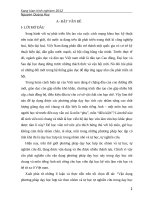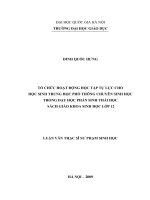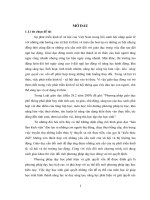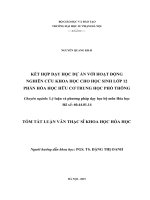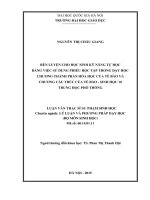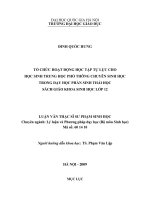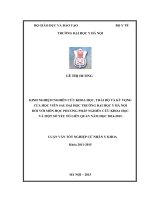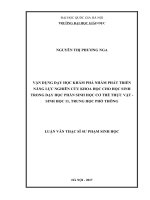As the iispector said cropted bộ sách tiếng anh dùng để học từ vựng
Bạn đang xem bản rút gọn của tài liệu. Xem và tải ngay bản đầy đủ của tài liệu tại đây (15.92 MB, 42 trang )
ISBN 978-0-19-479108-3
II 11111111
780194 791083
AS THE INSPECTOR SAID
and Other Stories
Criminals always think they are cleverer than other
people - cleverer than the detectives, cleverer than the
people that they plan to rob or murder. But the
criminals in these five stories are not always successful,
and they meet some very surprising difficulties.
Sonia's boring little husband is only interested in his
books and old silver. He has no idea what his wife and
her lover plan to do - or does he? . . . A burglar
whispering secrets on a train - how could he know that
a thirteen-year-old girl can read his lips from the other
side of the carriage? . .. Dunstan Thwaite decides he
must do something about the man who is blackmailing
him - it will look like an accident, of course ... And
Flambeau, the most famous thief in Europe, thinks it
will be so easy to steal the Blue Cross from Father
Brown, who is only a simple little priest ... But perhaps
it is safer not to do the crime yourself. If, like Mr
Elliston, you pay another man to do the murder,
nothing can possibly go wrong ...
OXFORD BOOKWORMS LIBRA R Y
Crime & Mystery
As the Inspector Said
and Other Stories
Stage 3 (1000 headwords)
,:J;.
Series Editor: Jennifer Bassett
Founder Editor: Tricia Hedge
Activities Editors: Jennifer Bassett and Alison Baxter
RETOLD BY JOHN ESCOTT
As the Inspector Said
and Other Stories
OXFORD UNIVERSITY PRESS
OXFORD
UNIVERSITY PRESS
Great Clarendon Street, Oxford
OX2
60p
CONTENTS
Oxford University Press is a department ofthe University of Oxford.
It furthers the University's objective of excellence in research, scholarship,
and education by publishing worldwide in
Oxford New York
Auckland Cape Town Dar es Salaam Hong Kong Karachi
Kuala Lumpur Madrid Melbourne Mexico City Nairobi
New Delhi Shanghai Taipei Toronto
With offices in
Argentina Austria Brazil Chile Czech Republic France Greece
Guatemala Hungary Italy Japan Poland Portugal Singapore
South Korea Switzerland Thailand Turkey Ukraine Vietnam
OXFORD and OXFORD ENGLISH are registered trade marks of
Oxford University Press in the UK and in certain other countries
This simplified edition © Oxford University Press
2008
Database right Oxford University Press (maker)
INTRODUCTION
As the Inspector Said
1
Cyril Hare
The Man Who Cut Off My Hair
6
Richard Marsh
First published in Oxford Bookworms 1994
2 4 6 8 10 9 7 5 3 1
No unauthorized photocopying
All rights reserved. No part of this publication may be reproduced,
stored in a retrieval system, or transmitted, in any form or by any means,
without the prior permission in writing of Oxford University Press,
or as expressly permitted by law. or under terms agreed with the appropriate
reprographics rights organization. Enquiries concerning reproduction
outside the scope of the above should be sent to the ELT Rights Department,
Oxford University Press. at the address above
The Railway Crossing
21
Freeman Wills Crofts
The Blue Cross
34
C. K. Chesterton
You must not circulate this book in any other binding or cover
and you must impose this same condition on any acquirer
Cash on Delivery
Any websites referred to in this pub lication are in the public domain and
their addresses are provided by Oxford University Press for information only.
Oxford University Press disclaims any responsibility for the content
Edmund Crispin
ISBN 9780194791083
A complete recording of this Bookworms edition of
As the Inspector Said and Other Stodes is available on audio CD ISBN 978 0194790918
Printed in Hong Kong
53
GLOSSAR Y
ACTIVIT IES:
Before Reading
58
ACTIVITIES:
While Reading
60
ACTIVITIES:
After Reading
62
ACKNOWLEDGEMENTS
mustrated by: Fiona MacVicar
The publishm are grateJili to thefollowing
for their kind pennission to adapt copyright material:
A. P. Watt Ltd (on behalf of A. A. Gordon Clark) for As the Inspector Said
taken from Best Detective Stories by Cyril Hare: A. P. Watt Ltd (on behalf of
The Authors' Contingency Fund) for 11te Railway Crossing. which was
ori!,~nally published as The Level Crossing: A. P. Watt Ltd (on
behalf ofJean Bell) for Cash on Delivery
Word count (main text): 9600 words
For more information on the Oxford Bookworms Library,
visit www.oup.com/eltfbookworms
49
ABOUT THE AUTHOR
67
ABOUT THE BOOKWORMS LlBRAR Y
69
AS THE INSPECTOR SAID ...
Cyril Hare
It is impossible to say when Charles Darrell and Sonia French
first decided to murder Sonia's husband, Robert. Robert was
nearly twice as old as Sonia, and he married her ten years
before Charles Darrell came into her life. For eight of those
years, Sonia was bored with her husband, although he did not
seem to realize this. He was more interested in his books,
and the silver which he bought.
Sonia and Charles were lovers for six months before
things became difficult. People were beginning to talk, and it
could not be long before Robert found out about them.
'Robert will never give me a divorce,' thought Sonia. 'And
Charles and I have no money of our own.' But Sonia knew
that Robert's silver alone was worth enough money to make
life very comfortable for her and Charles.
By a strange accident, it was a policeman who gave them
the idea for their murder plan. The inspector made a surprise
visit to the Frenches' house one evening. Charles was also
there. He often came in for a drink.
'There have been several burglaries near here,' the
inspector told Robert, 'and we haven't caught the burglar.
We know who he is, and it can't be long before we catch him,
but we're very worried. He carries a gun, and we're almost
sure he has killed a man. Now this house is in a very lonely
place. Mr Darrell is your only neighbour. Y~u also have a lot
of valuable silver.'
1
As the Inspector Said and Other Stories
As the Inspector Said ...
'What are you trying to say?' asked Robert.
'I'm saying that it's sensible to be careful,' said the
inspector. 'Very careful. Why not put your silver in the bank,
until the burglar is caught?'
'1 don't want to do that,' said Robert.
The inspector tried not to sound angry. 'Well, 1 have
warned you, sir,' he said. 'Please remember that.'
The inspector left, and Charles said, 'The inspector didn't
warn me. He knows I've nothing worth stealing. But if this
gunman does visit me, he'll be sorry. 1 have a gun, and 1
won't think twice before using it.'
He was tall and strong, and Sonia thought he was very
good-looking. And she did not try to hide her feelings.
'I feel sorry for the burglar who tries to frighten you,
Charles,' she said.
Three nights later, Sonia was lying awake in her bed. Robert
was asleep. It was ten minutes to two.
Sonia was excited. 'Ten minutes before Charles enters the
house,' she thought. It was ten long minutes.
And then she heard a noise. Glass breaking, followed by
the sound of a window as it was pushed up.
Robert did not wake up. Sonia waited until she heard the
sound of Charles climbing through the open window, then
she reached across to Robert's bed.
'Robert!' She was shaking him. 'Wake up. There's
somebody downstairs!'
Robert woke slowly. 'What? Someone downstairs? No,
2
'It's sensible to be careful.'
I'm sure you're--' He sat up in bed, awake now. 'There is
someone! I'll have to go down, 1 suppose.'
He put on his old grey dressing-gown, and went out of the
room. Sonia waited in the dark. It seemed a very long wait, but
it was less than half a minute. Then a thin line of light appeared
under the bedroom door. Sonia heard her husband give a
sudden cry, then she heard a gun explode. Something - or
someone - heavy fell to the floor, then a door \vas banged open,
and there was the sound of running feet outside the house.
3
As the Inspector Said and Other Stories
As the Inspector Said ...
Sonia waited. 'Charles must have time to escape before I
call the police,' she thought.
when he walked into the room where he kept his silver, he
She put on her bedside light and got out of bed. Now it
was all over, she felt strangely calm. She knew what she was
going to say to the police. How soon could she marry
Charles? Six months from now? They could go to Venice for
a holiday, after they were married. She had always wanted to
see Venice ...
Then the door opened.
And Robert walked in.
wanted to cry. All of the best pieces were gone.
He closed the door and went into his study. But before he
telephoned the police, he was careful to clean the small gun
that was in his dressing-gown pocket. Then he locked it
inside his desk. He had taken care of the one problem in his
usually very tidy life, and he wanted to make sure he would
have no more trouble.
As the inspector said, it was sensible to be careful.
For a long moment, Sonia could only look at him, her
stomach sick with fear. He looked back at her, silent, whitefaced and untidy. But alive.
'What - what happened?' she said.
'He got away,' said Robert. 'I'm afraid he's taken some of
my best silver with him. I wish now I had listened to the
inspector and sent it to the bank.'
'But I heard a gun,' said Sonia. 'I thought you - you're not
hurt, Robert?'
'No, Sonia, I'm not hurt,' said Robert. 'But I have some
bad news. It's Charles. I think the dear, brave man was
watching the house, and followed the burglar in, to try and
help us. He's at the bottom of the stairs. I'm afraid there is
nothing that we can do for him.'
Sonia fell forwards, her eyes closing, and Robert caught
her. He carried her to the bed, then went downstairs. When
he reached the bottom, he had to step over the body. He did
this calmly, stepping around the blood on the carpet. But
4
He was careful to clean the small gun that was in his
dressing-gown pocket.
The Man Who Cut Off My Hair
THE MAN WHO CUT OFF MY HAIR
Richard Marsh
The other man said something in a low voice, but his face was
turned away from me. The first man replied, and I read his lips
again. 'His name is Colegate, and he uses it as a summer cottage.
My name is Judith Lee and I am a teacher. I teach people who
He's got some of the best old silver in England.'
are deaf and dumb, and I teach them by lip-reading. When
The other man shook his head and turned so I could see
people say a word, they all move their lips the same way, so
his face. I saw him say: 'Old silver is no better than new. You
if you watch them carefully, you know what they are
can only melt it.'
The first man's face became red. 'Only melt it! Don't be
saymg.
My father was one of the first people to teach lip-reading.
stupid! I can sell old silver at good prices. And that silver in
My mother was deaf, but she could lip-read, so lip-reading
Myrtle Cottage must be worth more than a thousand
has always been part of my life. And because I have always
pounds. There's a silver salt-cellar worth at least a hundred.'
been able to do it, I was able to playa part in the adventure
The other man looked at me while I was watching his
I am going tell you about .. .
friend speak. He had fair hair and blue eyes. 'That child is
watching us,' he whispered. 'Be careful.'
I was thirteen years old when it happened. My mother and
The look in those blue eyes began to frighten me.
father were visiting another country, and I was staying in a
The first man said, 'Let her watch, she can't hear us.'
small village, in a cottage which we owned. Mrs Dickson,
I was alone with them, and I was quite small. So I looked
our servant, was staying there with me.
back at my magazine instead of watching the rest of their
I was returning home by train one day, after a visit to some
conversation. I knew Myrtle Cottage because it was not very
friends. There were two people sitting opposite me, a man
far from our own cottage. And I knew Mr Colegate, and
and a woman. The woman got out at a station not far from
about his old silver. I knew the silver salt-cellar the two men
my home. Then a man got in and sat beside the one who was
spoke about, and wondered why they were interested in it. I
already there. They seemed to know each other.
They talked quietly for some minutes, and it was
impossible to hear what they said. But I only had to look at
was very young. I did not think: 'These two men who speak
in whispers may not be honest.'
They both got out at the station before our village.
their faces . I was reading a magazine and looked up to see the
first man say something which surprised me.
' ... Myrtle Cottage. It's got a large myrtle tree in the front garden.'
6
After tea that evening, I went for a walk without telling Mrs
Dickson. My walk took me past Myrtle Cottage. It was
7
As the Inspector Said and Other Stories
The Man Who Cut Off My Hair
small, and there were no other houses near it. I knew that Mr
Colegate was away, but when I went into the garden, I saw
that the front-room window was open. I looked inside. What
I saw surprised me very much.
In the room was the first man from the train. All of Mr
Colegate's silver was on the table in front of him, and he was
holding the silver salt-cellar. I did not know what to think.
What was he doing there? What should I do? I was still trying
to decide when a hand went round my throat.
'If you make a sound, I'll kill you,' said a man's voice in
my ear. 'Believe me, I will!'
It was the other man, and he recognised me.
'It's the girl from the train!' he said.
The first man came to the window. 'What's happening?'
he asked. 'Who's that child you're holding?'
'That child is watching us.'
The other man pushed my face forwards. 'Can't you see?
I knew she was listening!'
'She couldn't hear us on the train,' said the first man.
'Nobody could hear our whispers. Give her to me.'
I was passed through the window, and now it was his
hands that went round my throat. 'Who are you?' he wanted
to know. 'If you scream, I'll pull your head right off you!'
I did not move or speak.
'Cut her throat,' said the other man, and took a long,
terrible-looking knife with a silver handle from the table.
'Wait,' said his friend. He took a piece of rope from his
bag. Then they pushed me into a chair and '~tied the rope
around my arms and legs. They also tied something across
8
9
As the Inspector Said and Other Stories
The Man Who Cut Off My Hair
my mouth to stop me speaking.
The man with blue eyes moved towards me with the knife.
I was sure he was going to cut my throat. But he took my
long hair in one hand, and with that terrible knife he cut all
of it from my head!
I was more angry than I thought possible. I wanted to take
that knife and push it into him! My long hair was more
valuable to me than almost anything. Not because of my
own love of it, but because my mother loved it. It pleased her
so much, and she often told me how beautiful it was. And
now this man had robbed me of it in the most terrible way.
At that moment, I wanted to kill him.
He hit me across the face with my own hair. 'It didn't take
me long to cut it off,' he said, 'but I'll cut your throat quicker
if you try to move.'
The first man said, 'Leave her alone. She can't move and
she can't make a sound. Come over here and help me.'
The man with blue eyes let my hair fall all over me. Then
the two of them began to put Mr Colegate's silver into two
large bags. That was when I realized they were stealing it,
and there was nothing I could do.
The man with blue eyes moved towards the window,
carrying one of the bags. The first man put a hand on his arm,
and I watched him whisper, 'Do you remember the plan?'
The man with blue eyes put his mouth close to the other
man's ear. I watched his lips as he said, 'Cotterill, Cloakroom,
Victoria Station, Brighton Railway.'
I knew the words were important and promised myself
The man with blue eyes moved towards me with the knife.
10
11
As the Inspector Said and Other Stories
The Man Who Cut Off My Hair
that I would not forget them.
He got out of the window and his bag was passed to him.
standing beside me. With her were Dr Scott, Mr Colegate,
He turned towards me and said, 'Sorry I can't take a piece of
Pierce the village policeman, and another man. I discovered
your hair. Perhaps I'll come back for some later.' Then he
later that he was a detective.
I knew no more until I woke up in bed with Mrs Dickson
went, and anger burned inside me.
I saw that I was in a room in Myrtle Cottage, and sat up
in bed - and remembered everything.
His friend did not look at me. He took his bag and went
out through the door. I don't know what happened to him
'He cut off my hair with the long knife!' I said.
afterwards. I was left alone, all through that night.
My head felt strange. I asked for a mirror, then became
I was not afraid, but the rope hurt my arms and legs. I
repeated the words, 'Cotterill, Cloakroom, Victoria Station,
Brighton Railway.' I was sure they were important.
I did not sleep that night. Day came, and I wondered what
angry again when I saw the blue-eyed man's work. Before
)
anyone could stop me, I jumped out of bed.
'Cotterill, Cloakroom, Victoria Station, Brighton Railway,'
I said. 'Where are my clothes?'
Mrs Dickson was doing. Was she looking for me? I had some
At first they thought I was crazy. But then I told them my
friends who lived three or four miles away. Sometimes I
story. 'Cotterill, Cloakroom, Victoria Station, Brighton Railway,'
stayed the night with them, without telling anyone at home.
I said again. 'That's where I'm going to catch the man who cut
Did Mrs Dickson think I was with them?
off my hair. And if we don't go quickly, we may be too late.'
I do not know what time it was when I heard the sound of
Mr Colegate agreed. He wanted to get his silver back as
feet outside. The day seemed almost over. I watched the open
much as I wanted to find the man who cut my hair. So we
window, and suddenly a face appeared.
went up to London on the first train that we could catch -
It was Mr Colegate.
Mr Colegate, the detective, and an almost hairless child.
'Judith!' he said. 'Judith Lee!'
He was not a young man, but he climbed in through that
We got to Victoria Station and went to the cloakroom.
window as quickly as a boy. He took a knife from his pocket
'Is there a parcel here in the name of Cotterill?' asked the
and cut the rope around my arms and legs, then he uncovered
detective.
my mouth and at last I could speak.
'Cotterill, Cloakroom, Victoria Station, Brighton Railway,'
ago,' the cloakroom man replied. 'Didn't you see him
I said. Then I fell into Mr Colegate's anns.
walking off with it?' He looked along the station. 'There he
'One in the name of Cotterill was taken only half a minute
is! Someone's going to speak to him.'
12
13
;;
As the Inspector Said and Oth er Stories
The Man Who Cut Off My Hair
I saw a man carrying a parcel, and I saw the man who was
going to speak to him. 'It's the man who cut my hair!' I shouted,
and ran towards him as fast as I could go. He looked round and
saw me, and quickly realized who I was. He whispered to the
man with the parcel before running away.
I saw clearly what he said. 'Bantock, 13 Harwood Street,
near Oxford Street.' Those were the words. And then he
turned and ran away. Mr Colegate and the detective were
close behind me. The man with the parcel saw us, and at
once he dropped the parcel and ran off.
We did not catch him, or the man who cut my hair. The
station was full of people coming off a train, which made it
easy for both men to escape. But we got the parcel. It was not
big enough to contain Mr Colegate's silver, we realized that.
But it did contain a much bigger surprise.
Jewels!
A London detective was sent for. He looked at the jewels and
said, 'These are the Duchess of Dachet's jewels. The police
all over Europe are looking for them.'
The man from the cloakroom was with us. 'That parcel
has been with us for nearly a month,' he said. 'The person
who took it out paid for twenty-seven days.'
'I wish I could catch him,' said the London detective. 'I
have a word or two that I want to say to him.'
'I think I know where you can find him,' I
13 Harwood Street, near Oxford Street.'
'Cotterill, Cloakroom, Victoria Station, Brighton Railway.'
14
'Who is Bantock?' the detective asked.
15
~aid.
'Bantock,
The Man Who Cut Off My Hair
As the Insp ector Said and Other Stories
'I don't know,' I said. 'But I saw the man who cut off my
hair whisper those words before he ran away.'
'You saw him whisper them?' The London detective
looked at the others. 'What does she mean? Young lady, you
were fifteen metres away. How could you hear him whisper?'
'I didn't say I heard him whisper,' I replied. 'I said I saw
him. I don't need to hear to know what a person is saying.'
'Judith is an excellent lip-reader,' said Mr Colegate. He
)
explained, but the others found it hard to believe.
'So what did you see him whisper?' asked the detective.
'I'll tell you if I can come with you,' I said.
The detective laughed. He seemed to think that I was
amusing, but I don't know why. He did not understand how
angry I was about my hair. 'All right,' he said. 'You can
come. Now, tell me what you saw him whisper.'
So I told him again and he wrote it down.
'I know Harwood Street, but I don't know Mr Bantock,'
he said. 'First I'll send a message for some help, then we'll go
and visit Mr Bantock - if there is a Mr Bantock.'
The four of us went in a taxi - the two detectives, Mr
Colegate and 1. After a while, the taxi stopped on the corner
of a street.
'This is Harwood Street,' said the London detective. 'We
can walk the rest of the way. We don't want a taxi to stop
outside the door. They may guess who we are.'
It was a street full of shops. The shop at number 13 sold
~"
jewels and other less valuable things. The name 'Bantock'
Jewels!
16
was over the top of the window.
17
As the Inspector Said and Other Stories
Th e M an Who Cut Off My Hair
As we reached the shop, a taxi stopped outside it and five
men got out. The London detective recognized them and did
not look pleased. 'Now our visit won't be a surprise,' he said.
'Come on, let's go in quickly.'
And we went in, the detective first and me behind him.
There were two young men standing close together at the
other side of the shop. When they saw us, I saw one whisper,
'They're detectives! Ring the alarm bell!'
'He's going to ring the alarm bell!' I shouted.
The men from the other taxi were also detectives.
They came in quickly and held each of the two young men.
There was a door at the end of the shop which the London
detective opened. 'Stairs,' he said. 'We'll go up. You men
wait here until you're wanted.'
I followed him up the stairs. At the top were two more
doors. I could hear voices coming from behind one of them.
The London detective went towards it. He opened the door
and went in, and I was close behind him. There were several
men in there, but I was only interested in one. He was
standing on the other side of a table.
'That's the man who cut off my hair!' I cried.
He seemed at first like a man who had seen a ghost, but
then he said, 'I wish I had cut your throat!'
The police caught all the thieves. They were wanted all over
the world for other robberies. Mr Colegate got his silver
back. Mr Bantock, who owned the shop, was someone who
bought and sold stolen jewels. He and all the other men in
'That's the man who cut off m y hair.'
18
19
As the Inspector Said and Other Stories
that room were sent to prison.
It took many years for my hair to grow long again, and it
never grew as long as before. Each time I looked into a
mirror, some of my anger returned.
But the man who cut my hair was stupid. Before he cut it,
the rope hurt me badly and I wasn't interested in what he and
his friend were doing or saying. But after he cut it, I was very
angry indeed, and so I watched every move which they - and
their lips! - made!
THE RAIL WAY CROSSING
Freeman Wills Crofts
Dunstan Thwaite looked at the railway crossing and decided
that it was time for John Dunn to die. It was a very suitable
place for a murder. There were trees all around, and they hid
the trains which came so fast along the railway line. The
nearest house was Thwaite's own, and this was also hidden
by the trees. People and traffic did not use the crossing very
often, and the big gates were kept locked. There was a small
gate used by passengers going to the station, but at night it
was always quiet.
Thwaite was a worried man. He had to use sleeping
powders to help him sleep. But after tonight, things were
going to be different. The time had come to stop the
blackmail. The time had come for John Dunn to die.
It all began five years earlier . . .
Thwaite worked in the offices of a large company, and his
only money was the money that the company paid him. It
was not much, but it was enough. Then he met the beautiful
Miss Hilda Lorraine and asked her to marry him.
She came from an important family who were supposed to
be very rich, but in fact they had less money than Thwaite
had thought. He learned that he would have to pay for the
wedding himself. And he did not have enough money for the
expensive kind of wedding that Miss Lorrai~e wanted. So
Thwaite stole a thousand pounds, by changing the figures in
21
The Railway Crossing
As the Insp ector Said and Other Stories
the company's books. He planned to put the money back
after he was married, but someone discovered that it was
mlssmg.
Thwaite kept quiet. Another man was thought to be the
thief, and he lost his job. Thwaite still said nothing.
But John Dunn worked in the same office. He worked
closely with Thwaite and guessed Thwaite's crime. He
searched through the company's books until he found what
he was looking for. Then he went to Thwaite.
'Sorry to have to ask you, Mr Thwaite,' he said. 'I need a
hundred pounds ... for my son. He's in a bit of trouble, you
,
see ...
'But you don't have a son,' said Thwaite.
Dunn just smiled. It wasn't a very nice smile. 'A hundred
pounds,' he said again.
And then Thwaite knew that he was being blackmailed.
H e paid Dunn one hundred pounds, and Dunn said
nothing more for a year. During that time, Thwaite got
f
married.
Then the day came when Dunn asked him for more
money.
'Two hundred and fifty pounds,' he said to Thwaite.
'I can't pay-' began Thwaite.
But he did. Either he paid or he went to prison.
It went on for five years, and each time Dunn wanted more
money. Thwaite found it difficult to live on the money that
he was left with. His wife liked expensive things. An
expensive house, an expensive car, visits to expensive
'A hundred pounds,' he said again.
22
23
As the Inspector Said and Other Stories
The Railway Crossing
restaurants. She also discovered that some of the money her
husband was paid each year seemed to disappear. He tried to
lie about it, but he knew that she thought he was paying to
keep another woman.
Oh, how he hated John Dunn! Something must happen!
And then he remembered the railway crossing.
It was not a new idea. Weeks before, he had thought about
what could happen there. The idea came when the doctor
gave him some powders to help him sleep. He thought about
giving Dunn enough of them to kill him, but then he got a
better idea. Although he was afraid, Thwaite slowly realized
that murder was the only answer to his problem.
Then Dunn asked for more money.
'Five hundred pounds, Mr Thwaite,' Dunn told him.
'Five hundred!' said Thwaite. 'Why not ask for the moon?
You'll get neither one nor the other.'
'Five hundred,' repeated Dunn, calmly.
It was then that Thwaite decided to murder the other
man. He pretended to think about the money for a moment,
then he said, 'Come to my house tomorrow night and we'll
talk.' He remembered his wife was going to be away in
London all night. 'And bring those papers from the office
put a hammer into one pocket of his overcoat, and a torch
into the other pocket. The coat was outside the door of his
study. Lastly, he moved the hands on his watch and on the
study clock forward by ten minutes. Those extra ten minutes
which you want me to look at.'
'All right,' said Dunn.
The following evening, Thwaite put two hundred pounds
in his pocket. Then he put half of one of his sleeping powders
into a whisky bottle. There was only enough whisky for two
glasses, but there was an unopened bottle next to it. Next he
Jane was the servant who lived in the house with Thwaite
and his wife. She brought Dunn into the study.
Thwaite smiled in a friendly way. 'Oh, good. You've
24
25
would give him his alibi.
Thwaite knew that he must be extra careful. He knew that
people at the office thought there was some secret between
him and Dunn. A secret that Thwaite didn't want anyone to
know.
'If Dunn is killed,' he thought, 'they'll wonder if it was
really an accident, or if I murdered him.'
But if his plan went well, the police would believe that he
hadn't left the house.
Thwaite sat down to wait for John Dunn. He thought
about what he was going to do. Murder! He could almost see
his hand holding the hammer above Dunn; could hear the
awful sound of it crashing down on to the man's head. He
could see Dunn's dead body! Dead all except the eyes, which
looked at Thwaite ... followed him everywhere he went ...
He tried to calm himself. He remembered why he was
doing this. When Dunn was dead, his problems were over.
Half an hour later, Dunn arrived. Jane opened the door.
brought those papers for me to see, Dunn. Thank you.'
After Jane left, the two men looked at each' other.
'Give me the papers,' Thwaite said. 'I'll look at them now
As the Inspector Said and Other Stories
The Railway Crossing
that you've brought them.' Fifteen minutes later, he gave the
papers back to Dunn and sat back in his chair. 'Now, about that
other matter.' He got up. 'But why not have a drink first?'
'No, thank you,' said Dunn. He looked afraid.
'What are you afraid of?' said Thwaite. He gave Dunn the
opened whisky bottle and two glasses. 'We can both drink
the same whisky, if you like. Here, you do it.'
After a moment, Dunn put whisky into each glass, then he
waited until Thwaite drank before he drank his own. Thwaite
watched him. How long before the other man began to feel
sleepy? Thwaite needed all of one sleeping powder to make him
sleep, but Dunn did not usually take them.
'Listen, Dunn,' said Thwaite, 'I haven't got five hundred
pounds, but I can give you this.' He took the money from his
pocket and put it on the table.
Dunn counted it. 'Two hundred?' he said, with a laugh.
'Are you trying to be funny?'
'I'm not saying it will be the last,' said Thwaite. 'Take it
now and be pleased that you've got it.'
Dunn shook his head. 'Five hundred, Mr Thwaite.'
'I've told you, I can't do it,' said Thwaite. 'And I won't do
it. You can tell everyone what I did - I don't care any more.
N ext he put a hammer into one pocket of his overcoat,
and a torch into the other pocket.
It's been five years, and I've done a lot of good work for the
company during that time. I saved them a lot more than a
thousand pounds. I'll sell this house and pay them back. I'll
take my punishment, then I'll go and live in another country
and give myself a new name.'
'And your wife?' said Dunn.
26
27
As the Inspector Said and Other Stories
The Railway Crossing
'My wife will leave the country first,' Thwaite told him.
'She'll wait for me to come out of prison. It won't be more
than two or three years. So you can take the two hundred
pounds, or you can do your worst!'
The powder in the whisky was beginning to make Dunn
sleepy. He looked stupidly at Thwaite, and Thwaite began to
worry. Had he given the other man too much? He looked at
the clock. There was not much time left.
'Will you take it, or leave it?' asked Thwaite.
'Five hundred,' said Dunn, in a heavy voice. 'I want five
hundred.'
'You can go and do your worst,' said Thwaite.
Dunn held out a shaking hand. 'Come on, pay me.'
Thwaite began to worry again. 'Are you feeling all right,
Dunn? Have some more whisky.' He opened the other bottle
and put some whisky in Dunn's glass. Dunn drank it, and it
seemed to make him feel better.
'That was strange,' he said. 'I didn't feel very well, but I
feel a little better now.'
'If you're going to catch your train, you must go,' said
Thwaite. 'Tell me tomorrow what you finally decide to do.
Take the two hundred with you.'
Dunn thought for a moment, then picked up the money.
He looked at his watch, then looked at the study clock. 'Your
clock is wrong,' he said. 'I have ten more minutes.'
'Wrong?' said Thwaite. He looked at his own watch. 'It's
your watch that's wrong. Look at mine.'
Dunn looked and seemed unable to understand it. He
stood up ... and almost fell back again.
Thwaite hid a smile. This was how he wanted Dunn to be.
'Y ou're not feeling well,' he said. 'I'll take you to the station.
Wait until I get my coat.'
Now that the time was here, Thwaite felt cool and calm.
He put on his coat, feeling the hammer in the pocket, then
went back into the study.
'We'll go out this way,' he said.
28
29
There was a side door from the study into the garden.
Thwaite closed it silently and it locked automatically behind
him. It was his plan to return that way, go in quietly again,
and then to change the clock and his watch back to the right
time. Then he would shout 'Goodnight', and close the front
door very loudly, pretending that somebody had left just
then. Next, he would call Jane and ask for some coffee,
making sure that she saw the clock. Then, if the police asked
her later, Jane could say that Thwaite did not leave the house
and that Dunn went to catch his train at the right time.
It was a dry night, but very dark. A train carrying freight
went slowly by. Thwaite smiled to himself. There were
plenty of freight trains at that time of the night. He needed
one of them to hide his crime for him. He planned to hit
Dunn on the head with the hammer, then put his body on the
railway line. A freight train would do the rest.
Slowly, the two men walked on, Thwaite holding Dunn's
arm. A light wind moved among the trees. Thwaite gently
pushed the half-asleep Dunn forwards. He pu'i: his hand into
his pocket for the hammer ...
As the Inspector Said and Other Stories
The Railway Crossing
And stopped.
His keys! They were still inside the house, and he could
not get back in without them! He would have to ring the
front door bell. His alibi was destroyed!
It was a bad mistake. Everything was wrong now. He
couldn't go on with the murder.
'Most murderers make mistakes,' thought Thwaite, trying
to calm himself. 'I've been the same.' But he was shaking
with fear as he thought about the mistake. Suddenly, he
could not walk another step with Dunn.
'Goodnight,' he said to the other man.
And before they reached the crossing, he turned and
walked back to the house.
For ten minutes, Thwaite walked up and down outside
until he began to feel calm again. Then he rang the bell.
A few moments later, Jane opened the door.
'Thank you, Jane,' he said. 'I went to see Mr Dunn over
the crossing, and I forgot my keys.'
He went to bed a happier man. He was not a murderer.
When he was eating his breakfast the next morning, he
decided what to do. 'I'll tell them at the office that I stole the
thousand pounds,' he said to himself. 'I'll take my punishment,
and then I can have some peace again.'
It suddenly seemed so easy.
Until Jane came in.
'Have you heard the news, sir?' she said. 'Mr Dunn was
killed by a train on the crossing last night. A man who was
working on the railway line found him this morning.'
30
His keys! They were still inside the house.
31
As the Inspector Said and Other Stories
Th e Railway Crossing
Thwaite slowly went white. Jane was looking at him
powder? Why was the study clock wrong by ten minutes? (At
strangely. What was she thinking? What story did he tell her
dinner-time earlier on the same evening, Jane had noticed
the night before? He couldn't remember!
that it was right.) And why was a hammer found in his
'Dunn killed!' he said. 'How terrible, Jane! I'll go down.'
The body was in a small railway building, near the line.
overcoat pocket?
Then the police found papers in Dunn's house. The hand-
There was a policeman outside.
writing on them was Dunn's. It told the story of Thwaite and
'A sad accident, Mr Thwaite,' the policeman said. 'You
knew the man, didn't you, sir?'
the thousand pounds, and it told how Thwaite was a thief.
'He worked in my office,' replied Thwaite. 'He was with
me last night, discussing business. I suppose this happened
on his way home. It's terrible!'
'It's very sad, sir,' said the policeman. 'But accidents will
The police then discovered that money taken from Thwaite's
bank account over the last five years always appeared a few
days later in Dunn's bank book.
Lastly, the time of death was known to be 10.30 pm
because Dunn's blood was found on the train that went
through the railway crossing at that time. It was also seven
happen.'
'I know that,' said Thwaite. 'But I wish he hadn't drunk so
much of my whisky. I was going to walk with him to the
station.'
The policeman looked closely at Thwaite. 'And did you, sir?'
'No,' said Thwaite. 'The cold night air seemed to make
him feel better. I turned back before the crossing.'
The policeman said no more, but later that day two more
policemen came to the office. 'Have they talked to Jane?'
wondered Thwaite. Again he told them, 'I left Dunn before
we reached the railway crossing.' They wrote down what he
said to them, then went away.
Next day, they came back.
There were things that Thwaite could not explain to them.
Why did the whisky bottle contain what was left of a sleeping
32
minutes before Jane opened the front door to let Thwaite
back in.
At first, Thwaite had no answers to all their questions.
Finally, on his last morning, he told them the true story.
Then he went to his death bravely.
The Blue Cross
THE BLUE CROSS
G.K. Chesterton
The man who got off the boat at Harwich had a short black
beard. There was nothing to show that he had a gun in his
coat pocket, and nothing to show that he was one of the
cleverest men in Europe. He was Valentin, the chief of the
Paris police, and the most famous detective in the world. He
was coming from Brussels to London to make the most
important arrest of the century. Flambeau was in England,
and the police of three countries were trying to catch this
famous thief.
In London there was a big meeting of priests from all over
the world, and Valentin was guessing that Flambeau would
use this meeting for some criminal plan or other. Flambeau
was strong and clever, and he enjoyed a joke.
Once, he ran down the Rue de Rivoli with a policeman
under one arm.
But how was Valentin to find Flambeau? There was one
thing to help him. Flambeau could put on other clothes, or
change the way he looked, but he was a very tall man and
When Valentin saw this last person, he almost laughed.
The little priest had a round, simple face. He had several
parcels which he found difficult to keep together, and a large
umbrella which often fell to the floor. Many priests would be
coming to London that day, Valentin thought. Coming
from their quiet little towns and villages. This one was
explaining to everyone that he must be careful because he
was carrying something made of real silver 'with blue stones'
in one of the parcels.
He got off the train at Stratford in east London with all his
parcels, and came back for his umbrella. When he did,
Valentin warned him not to tell everyone about his silver
'with blue stones'.
The detective was looking for people who were at least
two metres tall, because Flambeau was several centimetres
taller than this. He got off the train in central London and
went to the London police to ask for help if he needed it.
could not hide it. Because of this, Valentin was sure that
Flambeau was not on the boat.
He was also sure that Flambeau did not get on the train
going from Harwich to London. Only six other people got
on during the journey. One short railwayman, three short
farmers, one very short woman, and a very short priest going
up to London from an Essex village.
Then he went for a long walk.
He stopped suddenly in a quiet square. On one side the
buildings were higher than the rest, and there was a small
restaurant between the tall houses. It stood high above the
street, with steps going up to the front door. Valentin stood
looking at it, smoking a cigarette. When he was looking for
a criminal, if he had a clue, he followed it. If he had no clue
at all, he followed his own feelings. A man must begin
somewhere. And something about the quiet little restaurant
made Valentin want to start there. He went ~p the steps, sat
down by the window, and asked for a cup of coffee.
34
35
As the Insp ector Said and Other Stories
The Blue Cross
A few minutes later, Valentin was lifting the cup to his lips.
But he put it down quickly. 'I've put salt in it,' he said, and he
looked at the bowl of silvery powder. It was a sugar bowl. So
why did they keep salt in it? There were two full salt-cellars on
his table. What was in them? He tasted it. It was sugar.
He looked around. Except for one or two dark wet stains
on the white wall, there was nothing at all strange in that
place. Valentin called the waiter and asked him to taste the
sugar. The waiter was half-asleep, but he woke up when he
tasted the sugar.
'Do you play this joke on your customers every morning?'
asked Valentin.
The waiter did not know what to say. Then, suddenly, he
said, 'It was the two priests.'
'What two priests?' said Valentin.
'The two priests who threw soup at the wall over there,'
replied the waiter.
Valentin looked again at the dark wet stains.
'The two of them came in and drank soup here very early
this morning,' the waiter explained. 'They were both very
quiet. One of them paid the bill and went out. The other took
several more minutes to get his things together. Then he
picked up his cup, which was only half empty, and threw it
at the wall. I was in the back room, but I ran out to find the
restaurant empty. I tried to catch them in the street, but they
were too far away. They went round the corner into
~
Carstairs Street.'
The little priest had a round, simple face.
36
The detective jumped to his feet, put on his hat, and paid
37
As the Inspector Said and Other Stories
The Blue Cross
his bill. A moment later, he was outside.
He walked round into the next street. Although he was
excited and in a hurry, Valentin saw something in the front
of a shop that made him stop. The shop sold fruit, and there
were some oranges and some nuts at the front. They each
had cards with writing on them. The card on the nuts said:
'Best oranges, two for a penny.' The card on the oranges
said: 'Best nuts, four pence for a bag.'
Valentin looked at the two cards. 'I've seen this kind of
The policeman laughed. 'I have, sir. One of them stood in
the middle of the road, dropping parcels everywhere.'
'Which way did they go?' asked Valentin.
'They went on one of those yellow buses over there,'
answered the policeman. 'Those that go to Hampstead.'
Valentin told the policeman who he was, then said, 'Call
two of your men to come with me.'
In two minutes, an inspector and another detective
arrived. 'Well, sir,' began the inspector. 'How-?'
joke before,' he thought.
He told the man in the shop about the cards. The man said
nothing, but he put the cards in the right places.
'Can I ask you a question?' said Valentin. 'If two cards in
a shop are in the wrong places, how are they like a priest's
hat that has come to London for a holiday? Or, why do nuts
that are said to be oranges make me think of two priests, one
tall and the other short?'
The man in the shop looked angry. 'Are you a friend of
theirs?' he said. 'If you are, you can tell them that I'll bang their
stupid heads together if they knock over my apples again!'
'Did they knock over your apples?' asked the detective.
'One of them did,' said the man.
'Which way did they go?' asked Valentin .
'Up that second road on the left-hand side, and then across
the square,' answered the man.
'Thanks,' said Valentin, and hurried away. On the other
side of the second square, he found a policeman. 'Have you
seen two priests?' he asked.
'How do we know that the window has lInything to do
with them?' asked the inspector.
38
39
'I'll tell you on the top of that bus,' said Valentin.
When the three of them were sitting on the top seats, the
inspector said, 'A taxi is quicker.'
'True,' said Valentin. 'But we don't know where we're
going. All we can do is look for some strange thing.'
'What kind of strange thing?' asked the inspector.
'Any kind of strange thing,' replied Valentin.
The yellow bus went slowly up the roads to the north of
the city. The French detective became quiet. Lunch-time
came and went, and the long roads seemed to go on for ever.
Valentin sat silently and watched everything that went by.
The two other detectives were almost asleep when he
suddenly shouted. They quickly followed Valentin off the
bus without knowing why.
'Over there! ' said Valentin. 'The place with the broken
window!' He was looking at a restaurant. It had a large
window with a hole in the middle of the glass.
